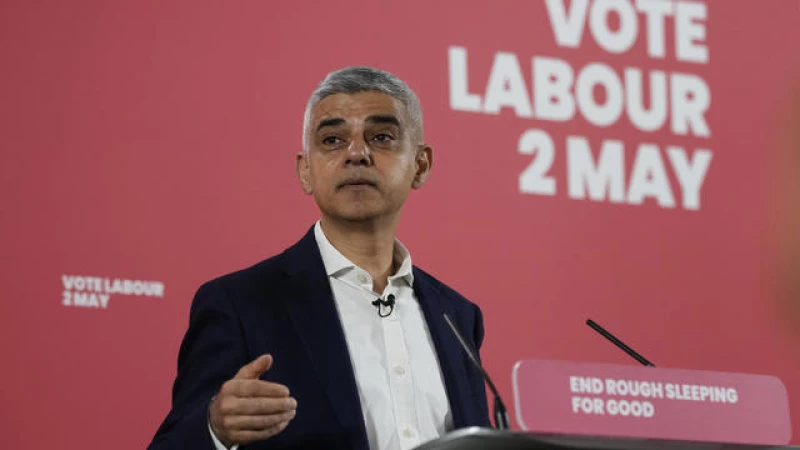In a stunning turn of events, Sadiq Khan, the mayor of London representing the Labour Party, clinched a historic third consecutive term at City Hall. This victory comes as another blow to the Conservative Party, just ahead of the upcoming general election.
Khan managed to secure over a million votes, capturing nearly 44% of the total vote, which was more than 11 percentage points ahead of his closest rival, Susan Hall from the Conservative Party. While Khan performed exceptionally well in inner London, he faced challenges in several outer boroughs.
Despite speculations of a close race on Friday, Khan's substantial lead indicated a shift from Conservative to Labour support compared to the previous mayoral election in 2021.
Having taken over the mayoral position from Boris Johnson in 2016, Khan has emerged as a polarizing figure in recent years.
His proponents highlight his various accomplishments, including the expansion of housebuilding, provision of free school meals for young children, efforts to control transport costs, and unwavering support for London's minority communities. On the other hand, his detractors criticize him for a rise in crime rates, anti-car policies, and permitting frequent pro-Palestinian demonstrations on weekends.
"Sadiq Khan was indeed the perfect choice," stated Labour leader Keir Starmer. "With two successful terms already, I have full confidence that he will continue to deliver in the future."
Over the weekend, the incumbent Labour mayors in Liverpool, Greater Manchester, and West Yorkshire secured their positions for another term, while the Conservative mayor in West Midlands faces a potential ousting pending a recount.
These victories follow Labour's recent gains in councils across England, some of which the party hadn't held for decades. Additionally, Labour won a special election for a parliamentary seat, indicating a significant potential defeat for the Conservatives in a general election scenario.
Despite the setbacks in the local elections, Prime Minister Rishi Sunak seems to have averted a rebellion within his party.
Sunak breathed a sigh of relief as the Conservative mayor of Tees Valley in northeast England secured reelection, although with a reduced share of the vote. However, the outcome in the West Midlands, where Andy Street, the Conservative mayor, may have lost, was less favorable for Sunak.
On a less positive note for Labour, the party's vote in predominantly Muslim areas in England was affected by dissatisfaction with the party leadership's pro-Israel stance during the conflict in Gaza.
Starmer acknowledged that the party has faced challenges with Muslim voters, but overall, the results were positive for the frontrunner to become the next prime minister.
Sunak holds the authority to determine the date of the upcoming election, hinting that it will likely take place in the latter half of 2024. Starmer urged him not to delay.
"We're tired of your division, your chaos, your failures," he declared on Saturday. "If after 14 years, you leave the country in a worse state than you found it, then you have no right to remain in power for even a moment longer."
The elections on Thursday across many parts of England held significance on their own, as voters chose who would oversee various aspects of their daily lives like waste management, road upkeep, and local crime prevention. However, with a national election on the horizon, these results are being examined from a broader perspective.
John Curtice, a political science professor at the University of Strathclyde, noted that the outcomes indicate Sunak has not been able to restore the Conservative party's reputation after the controversies involving his predecessors, Boris Johnson and later Liz Truss.
"That, in essence, is the key point," he shared on BBC radio.
In October 2022, Sunak took over as prime minister, succeeding Truss's brief term. Truss resigned after just 49 days following a controversial budget that included unfunded tax cuts, causing turmoil in financial markets and a sharp increase in borrowing costs for homeowners.
The chaotic and tumultuous leadership under Truss only added to the challenges faced by the Conservatives, who were already reeling from the scandals surrounding former Prime Minister Johnson. Johnson had to step down after being found to have misled Parliament regarding lockdown breaches at his Downing Street offices.
By late Saturday afternoon, with most of the 2,661 seats in the local elections counted, the Conservatives had lost approximately half of the 1,000 seats they were defending. In contrast, Labour had gained around 200 seats, despite some setbacks related to Gaza.
Other political parties, including the centrist Liberal Democrats and the Greens, also saw increases in their representation. Reform U.K., a party aiming to challenge the Conservatives from the right, achieved some victories, particularly in the special parliamentary election in Blackpool South, where they narrowly missed out on second place by less than 200 votes.







